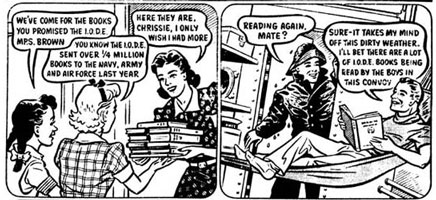Beginning in 1941, advertisements started to appear in the local papers with suggestions for content of soldiers' boxes and for the boxes themselves. Articles outlined the need for careful packaging. By 1944 the period from 15 September to 25 October had been designated as "Xmas Mail Month." A special 8-page supplement in the Journal that year carried ads from local retailers promoting items to send overseas as well as articles about how to pack.
The items received by Canadian men in other parts of the world were usually practical things, but more importantly the parcels were morale boosters. The poem "A Parcel from Home" describes the feeling associated with the receipt of a package.
As the number of parcels increased, the Post Office had to issue public warnings about what not to send. There had been serious consequences of the presence of matches or lighter fluid in parcels held in the holds of ships, not to mention the danger to postal workers. Cigarettes were a very popular commodity among the servicemen and the Macdonald Tobacco Company provided acknowledgement cards to be returned to the sender of its product.
In addition to the parcels mailed by the public through the Post Office and the comfort packages of the Red Cross, there were other items sent to the military overseas or at sea. The IODE was an organization that made a special effort to send what was needed. The national body decided in May 1942 to concentrate on comforts for the Navy and for refugees. The Summerside group made numerous seamen's bags that were each packed with a wool sweater, scarf, cap, mittens, and socks. The organization also made special items, including ditty bags, and collected books for the use of servicemen.
| Related Articles | Related Images | Related Memories | Related Websites | Inflation Calculator |
| Home Page | Site Map | Contact Us | Wyatt Heritage Properties |



